Symptoms of Depression and Anxiety in Women
Symptoms of depression and anxiety in women can vary considerably depending on the person and the cause. While depression in women may be very common, they are twice as likely to develop clinical depression as men, knowing this statistic doesn’t make it any easier if you are one of them.
So What is Depression?
Depression is a very serious and wide spread mood disorder that can cause you to feel sad, hopeless, helpless and/or worthless. It can be mild to moderate and include symptoms of apathy, decreased appetite, insomnia, a low self-esteem, and fatigue.
For women the symptoms can include the following:
– a persistent sad, anxious, or empty mood
– decreased interest or pleasure in everyday activities, as well as sex
– feelings of restlessness, irritability, or excessive crying
– feelings of pessimism, hopelessness or guilt
– weight gain or weight loss due to a decreased interest in food (or for some overeating)
– fatigue, or a decrease in energy
– thoughts of suicide and/or suicide attempts
– persistent symptoms such as headaches, digestive disorders and/or chronic pain
On the other side of depression, another symptom many women experience is mania.
Mania is a highly elevated mood that may occur with bipolar disorder. Mood swings can go from a severely low depression to a high of mania, and although it may seem like a “happy” mood, it is an excessive one and should be treated.
The symptoms of mania may include:
– An abnormally elevated mood
– Irritability
– A decreased need for sleep
– Racing thoughts that can lead to an increase in talking, or grandiose ideas
– Increased activity, including sexual activity (an overall increase in energy)
– Poor judgement from this increase can lead to risk-taking behavior
– Inappropriate social behavior
It’s always joked upon that women are moodier than men, and while many women may completely disagree with that, as most of us have seen the moody side of men as well, it can’t be ignored that depression is still more common in women than men. The severity of the cases can be increased due to all of the hormone levels constantly shifting in the body. From puberty to pregnancy and then finally menopause a women’s body is constantly influx. After giving birth or in the event of a miscarriage, hormone levels seem to take the body over, leaving the woman and those around her to cope with the chaotic roller coaster ride.
Every month women have to deal with a new shift, men may joke about a women’s moodiness around her “time of the month”, but it really is no laughing matter. Some women experience such a significant increase to their depression that it can be quite serious. PMDD is a severe syndrome that causes depression, anxiety and mood swings, typically occurring a week before menstruation. These mood swings caused by all of the hormonal fluctuations can seriously affect their daily life, sometimes making it completely impossible to function properly.
Some things that can increase the chances of depression in women are reproductive, genetic as well as other biological factors. Personal relationships and certain psychological characteristics as well as stress may also trigger symptoms of depression and anxiety. A family history of mood disorders, early reproductive years, a loss of a parent at a young age, loss of social support or the threat of the same, sexual abuse as a child, some medications, as well as stress from things like losing a job, a troubled relationship (separation or divorce) can all be factors.
Women have a lot to cope with, no only are there every day things, that most people deal with, on the table, but they are thrown the extra adage joy of hormones into the mix. And these hormones can fluctuate faster than the moon shifts. These symptoms of depression and anxiety in women are expansive, you may only experience a few yourself, but even one or two can be life altering. If you are experiencing any of the above symptoms, it can help considerably to see a doctor and/or find some support somewhere to help you manage and cope with them. Feeling alone can be one of the huge symptoms you feel, but ultimately you aren’t alone, you just need to know how to ask for help, that is the first step. If your depression stems from anxiety, Panic Away, might be a good first step for you.

